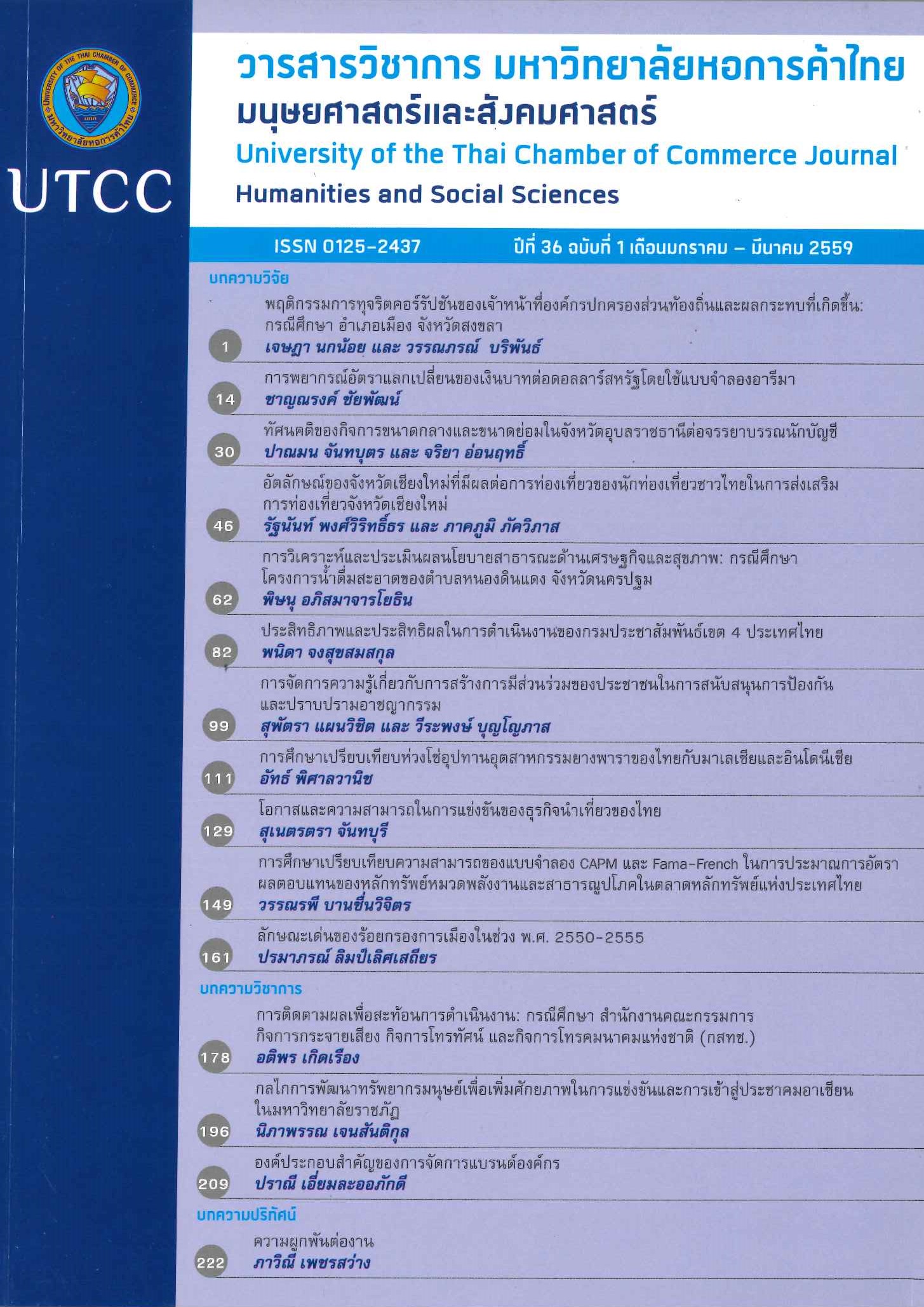Monitoring to Evaluate Operations: A Case Study at the National Broadcasting and Telecommunication Commission (NBTC)
Main Article Content
Abstract
This academic research aims to propose a concept of monitoring to evaluate operations: a case study at the Office of The National Broadcasting and Telecommunications Commission (NBTC). Significant emphasis is placed on implementing the monitoring concept as a tool to drive performance at NBTC, particularly in relation to parts of the budget usage, enhancing understanding in performance, channels for enlightening people, document preparation for publicizing, and people participation. Monitoring is crucial for an evaluation and success of organizational performance in overseeing the results of the NBTC working process and representing responsibility and transparency of work performance. This will lead to an effective study on long-term effects, based on conditions for success in analyzing for causes of the issues. A following analysis is expected to achieve a solution or identify the desired situation that will ultimately be defined in a form of objectives for the project/activity. Subsequently and finally, a Balanced Scorecard (BSC) will be created, which will reflect unanimous agreement. A Key Performance Indicator (KPI) for monitoring will be triggered by a main principle that is anticipating results occurring in line with the objectives, it will have the ability to be investigated, and will be fair. However, NBTC should expeditiously overcome three important and fundamental issues regarding 1) adaptability and flexibility in accordance with the economic and social system, 2) consideration of goal achievement through the mechanism of the political system, and 3) restoration and maintenance of norms and patterns of the citizen sector together with integration of relationships among components. The results collected from effective monitoring will be most important when following up work performance. Moreover, NBTC will be able to adapt the results as a guideline to develop the mechanism for monitoring in an efficient way by taking into consideration 4 components, such as 1) monitoring procedures that provide the exchange of knowledge and a share of resources among NBTC, the government sector and civil society, 2) monitoring strategies that cause dissemination of knowledge occurred directly from beneficiaries or the citizen sector, 3) monitoring to understand the results and situation of sharing opinions and participation in learning by every party, and 4) monitoring factors that affect the pattern of work of NBTC resulting in effectiveness. The significant key for NBTC to understand about monitoring is “the situation of knowledge sharing of all sectors in the society”.
Article Details
ลิขสิทธิ์ของบทความ
ผลงานที่ได้รับการตีพิมพ์ถือเป็นลิขสิทธิ์ของมหาวิทยาลัยหอการค้าไทย ห้ามมิให้นำเนื้อหา ทัศนะ หรือข้อคิดเห็นใด ๆ ของผลงานไปทำซ้ำ ดัดแปลง หรือเผยแพร่ ไม่ว่าทั้งหมดหรือบางส่วนโดยไม่ได้รับอนุญาตเป็นลายลักษณ์อักษรจากมหาวิทยาลัยหอการค้าไทยก่อน
References
Brigham, Nancy. 2011. “Tracer Studies: A Concrete Approach to a Virtual Challenge.” In Ben Kei Daniel (ed), Handbook of Research on Methods and Techniques for Studying Virtual Communities: Paradigms and Phenomena, pp.699-712. Hershey, N.Y.: Information Science Reference
Editorial Department, Office of Legal Affairs NBTC. 2011. “The Act of NBTC Regarding Frequency Assignment for Public Purpose”. Junniti March – April 2011: 1-2. (in Thai).
กองบรรณาธิการ สำนักงานกฎหมาย กสทช. 2554. “กฎหมาย กสทช. ฉบับใหม่กับการจัดสรรคลื่นความถี่เพื่อประโยชน์สาธารณะ” จุลนิติ มี.ค. - เม.ย.: 1-2.
Gorgens, Marelize, and Kusek, Jody Zall. 2009. Making Monitoring and Evaluation Systems Work : A Capacity Development Toolkit. Washington: World Bank.
The Healthcare Accreditation Institute. 2010. The Quality Development of Hospitals in Social Security Scheme. Bangkok: Social Security Office. (in Thai).
สถาบันรับรองคุณภาพสถานพยาบาล. 2010. การพัฒนาคุณภาพสถานพยาบาลในโครงการประกันสังคม. กรุงเทพมหานคร: สำนักงานประกันสังคม.
Leksansern, Arissara. 2014. Midstream Evaluation. Bangkok: Department of Education, Faculty of Social Sciences and Humanities, Mahidol University. (in Thai).
อริศรา เล็กสรรเสริญ. 2557. การประเมินกลางน้ำ (Midstream Evaluation). กรุงเทพมหานคร: ภาควิชาศึกษาศาสตร์ คณะสังคมศาสตร์และมนุษยศาสตร์ มหาวิทยาลัยมหิดล.
Louis, K.S., et al. 1984. Exchanging Ideas: The Comunication and Use of Knowledge in Education. Cambridge, MA: Abt Asociates.
Office of NBTC. 2014. Project Performance Monitoring and Evaluation Office of NBTC. Bangkok: The monitoring and evaluation of performance with Suan Sunandha Rajabhat University. (in Thai)
สำนักงาน กสทช. 2557. โครงการติดตามและประเมินผลการปฏิบัติงาน สำนักงาน กสทช. กรุงเทพมหานคร: คณะกรรมการติดตามและประเมินผลการปฏิบัติงาน ร่วมกับมหาวิทยาลัยราชภัฏสวนสุนันทา.
Prince DamrongRajanuphap Institute. n.p. Performance Evaluation and Effectiveness of Strategic Plans for Integrated Province Development. Bangkok: Academic Service Center at Chulalongkorn University. (in Thai).
สถาบันดำรงราชานุภาพ. ม.ป.ป . การประเมินประสิทธิภาพและผลสัมฤทธิ์ของแผนยุทธศาสตร์การพัฒนาจังหวัดแบบบูรณาการ. กรุงเทพมหานคร: ศูนย์บริการวิชาการแห่งจุฬาลงกรณ์มหาวิทยาลัย.
“The Royal Decree on Criteria and Procedures for Good Governance 2013” 2013. 9 October 2013. The Royal Thai Government Gazette. Vol. 120, No. 100: 1-16. (in Thai).
“พระราชกฤษฎีกาว่าด้วยหลักเกณฑ์และวิธีการบริหารกิจการบ้านเมืองที่ดี พ.ศ. 2546” 2546, 9 ตุลาคม. ราชกิจจานุเบกษา. เล่มที่ 120 ตอนที่ 100: 1-16.
Schomburg, Harald. 1995. Standard Instrument for Graduate and Employer Surveys. Kassel, Germany: Centre for Research on Higher Education and Work, University of Kassel.
Shrode, W. A. and Voich, D., 1974. Organization and Management: Basic Systems Concepts. Homewood, I.L.: Irwin Book Company.
Stufflebeam, D.L. 2000. “The CIPP Model for Evaluation”. In D.L. Stufflebeam, G. F. Madaus, and T. Kellaghan (eds.), Evaluation Models, pp.279-317. 2nd ed. Boston, N.Y.: Kluwer Academic Publishers.
Sujjapunroj, Narong. 1995. Preparation for Approving and Managing the Budget in Theory and Practice. Bangkok: Bopit Printing. (in Thai).
ณรงค์ สัจพันโรจน์. 2538. การจัดทำอนุมัติและบริหารงบประมาณแผ่นดิน ทฤษฎีและปฏิบัติ. กรุงเทพมหานคร: บพิธการพิมพ์.
Visaraporn, Sermsak. 1991. “Monitoring Strategy”. The Journal of the Royal Institute of Thailand in honor of H.R.H. Princess MahaChakriSirindhorn. Mahachulalongkornrajavidyalaya Press, The Royal Institute.: 188-196. (in Thai).
เสริมศักดิ์ วิศาลาภรณ์. 2534. “ยุทธศาสตร์การติดตามงาน” วารสารราชบัณฑิตยสถานเฉลิมพระเกียรติสมเด็จพระเทพรัตนราชสุดา สยามบรมราชกุมารี.: 188-196.
Yutyunyoung, Tranakjit. 2014. “Strategic Communication in an Organization”. University of the Thai Chamber of Commerce Journal 34, 2: 155-160.(in Thai).
ตระหนักจิต ยุตยรรยง. 2557. “การสื่อสารเชิงกลยุทธ์ในองค์กร.” วารสารวิชาการ มหาวิทยาลัยหอการค้าไทย 34, 2: 155-160.


